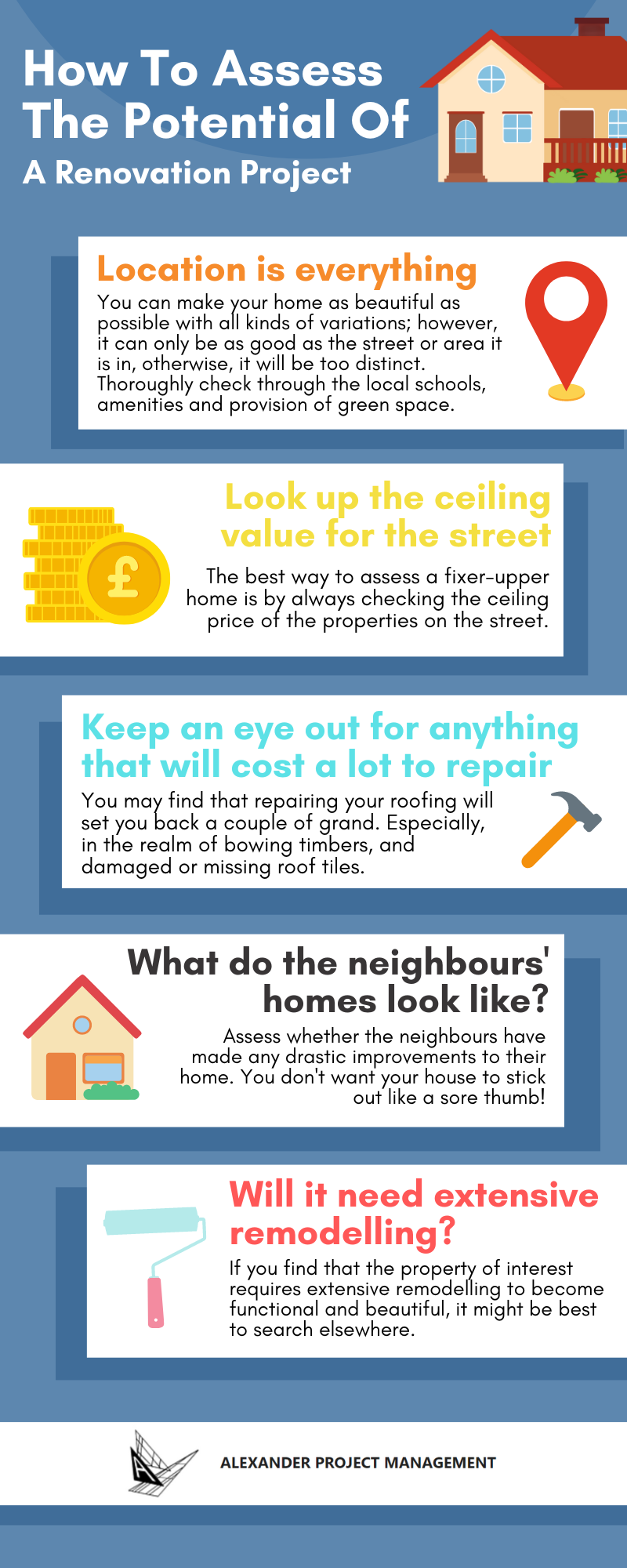How do you plan a renovation project? This article looks at how to assess the potential of a renovation project and types of home renovation. Alexander Project Management provide commercial renovation project management throughout Leighton Buzzard, Bedfordshire and Buckinghamshire. Find out how long it takes to renovate a house and making a comprehensive budgeting plan.
How To Assess The Potential Of A Renovation Project
When judging the potential of a property, the best policy is to look at it objectively and ask yourself how it could be improved. Ask whether or not you could extend the loft or a room in the property to increase the amount of living space used. Two of the most important rooms to look at are the kitchens and bathrooms.
These are often the highlights that help landlords and previous owners sell their properties. If there is extra space inside for an extra bathroom, and you'd like to increase the value, the home may have some potential. With all this aside, you want to ensure you don't get lumped with paying an enormous amount of money to renovate the home, as it won't make the experience worthwhile.
Prior to purchase, you want to hire a professional that is a member of the RICS (Royal Institute of Chartered Surveyors) to conduct a complete survey. These surveys are used to provide feedback on the repairs that need undertaking before you move in. You can use this feedback to estimate the associated costs and decipher whether renovation projects would be too costly.
Alongside a complete survey, there are a few other factors that we highly recommend considering before you purchase and begin renovating. These aspects include the following:
Location is (nearly) everything
Anyone looking for renovation bargains should follow the old saying 'Look for the worst house on the best street.' You can make your home as beautiful as possible with all kinds of variations; however, it can only be as good as the street or area it is in, otherwise, it will be too distinct.
Thoroughly check through the local schools, amenities and provision of green space. We recommend utilising Google Street View Maps and taking a stroll down the street. This will help highlight anything untoward and provide you with a feel for the location.

Look up the ceiling value for the street
It is a universal truth that often, to make money, you must spend money. However, there are a few limitations you should give yourself when dealing with a fixer-upper home. The best way to assess this is by always checking the ceiling price of the properties on the road of your potential home. Websites like Zoopla and Rightmove enable potential buyers to look at the price range of close-by or similar properties.
In doing so, you can get a rough idea of the area's maximum value. This will help decipher the return on investment when you have completed all post-home renovations. When researching, ensure you look at homes that replica your desired home in the structural content. For example, look at three-bedroom properties in the area if that is what you're seeking. It will provide more cost accuracy.
Keep an eye out for anything that will cost a lot to repair
You may find that repairing your roofing will set you back a couple of grand. Especially, in the realm of bowing timbers, and damaged or missing roof tiles. You want to ensure all aspects of the home and structure are functional before purchasing. Often missing tiles are a sign of trouble, as they could insinuate water leaks. If you're looking to avoid a costly renovation budget, check that the windows and their surrounding frames are in good condition.
To reduce heat loss and running energy costs, you can consider upgrading the single glazing to double-glazing. Therefore, it wouldn't be as expensive in the long term. However, we encourage homeowners to maintain characterful period windows where possible, as they may provide some uniformity to the surroundings.
What do the neighbours' homes look like?
It's always gracious to keep your surroundings in mind if you plan to move into a new property or change its external appearance in some way. You want to ensure all changes will still keep it in line with the rest of the street.
Assess whether the neighbours have made any drastic improvements to their home, whether or not they are well-maintained and that everyone around takes pride in their property. You want to ensure your home doesn't stick out like a sore thumb!

Is there scope to extend?
Suppose the house you're looking out isn't large enough to accommodate all habitants, you must consider how best to remedy it. You may spot easy places to transform, such as the loft or garage. Garage or loft conversions are some of the easiest for labourers to complete. They are also the best way to add further space to your property and its value.
With the extra ensuite toilet or bedroom, you can have implemented by professionals, you can expect an increase in value by approximately 15-20 percent. Another excellent opportunity for an extension is a large garden. If you have enough room, you may want to contact local professionals and enquire about a rear extension. We don't recommend doing this if you have a smaller garden as this will prevent you from enjoying outside space.
Before ploughing ahead with such plans, you must also look at what neighbouring properties offer, and assess the opinions of your neighbours. There are a few ways to cut extension costs to achieve a cheaper extension build; however, we recommend taking the ceiling value in mind.
Will it need extensive remodelling?
You can do so much to improve the aesthetic and practical value of your home. However, in some cases, the cost to do so could be incredibly high that it limits your Return On Investment (ROI).
If you find that the property of interest requires extensive remodelling to become functional and beautiful, it might be best to search elsewhere. Search for options that better match your layout and size desires.
Does it have modern heating and electricity?
Whilst this isn't exactly a dealbreaker, you'll likely want a home that doesn't need a complete costly rewiring or brand-new central heating installation. You'll find that an average three-bedroom home will be looking at costly services of around £3,000-£5,000 for each job.
Opting for a household with more modern technology is much more efficient and cost-effective than having replacements.
Old-fashioned fuse boxes with cast-iron or ceramic fuses, fabric cables, surface-mounted cables, and bakelite switches would need to be changed. Much older heating and electricity aren't as efficient or functional as modern installations.

Types of Home Renovation
Some of the most common home renovation projects across the UK include the following:
Single-Storey Extensions
Multi-Storey Extensions
Conservatory Installations
Loft Conversions
Complete Kitchen Remodels
Complete Bathroom Remodels
Basement Conversions
Garage Conversions
Garden Landscaping
How Long Does It Take to Renovate a House?
Plenty of factors affect the duration of your renovation project, making it difficult to determine how long it will take. However, there are average timeframes allocated to the most popular household renovations, and these are:
Renovation Type: Kitchen Renovation
Average Time: 4-10 Weeks
Renovation Type: Bathroom Remodel
Average Time: 3-6 Weeks
Renovation Type: Loft Conversion
Average Time: 7-12 Weeks
Renovation Type: Storey Extension
Average Time: 8-16 Weeks
Making A Comprehensive Budgeting Plan
For those looking to renovate a new home on a budget, we highly encourage the creation of a comprehensive budgeting plan. Before buying a home with the intention of renovation, you must be aware that aside from the house renovation cost, you mustn't forget to factor in the additional fees.
These fees include:
Reconnection Fees: When renovating a home, you may have to connect or reconnect the water supply, as when the home was left by the previous owners, it may have been disconnected. You may also need to pay for electricity to account for day-to-day living, or for the power tools needed by builders and engineers.
Professional Fees: These are any costs involved in the development process, such as Planning Permission, Building Regulations, Structural Engineer Reports, and a variety of professional surveys that you may require.
Contingency Funds: During the home renovation process, you may encounter a few issues or faults that you may have to remedy. In this case, you want to ensure you have extra cash on hand so that you can deal with these arising problems.
Legal Costs: You should expect to pay around £500-£2,000 to conveyancers or solicitors to speak and act on your behalf throughout the process.
Council Tax
Valuation Fees
Are you considering commercial renovation in Bedfordshire or the surrounding areas? Our chartered civil engineer specialises in project management throughout all stages of the process.
Alexander Project Management work with construction companies and individual home builders throughout Leighton Buzzard, Bedfordshire and Buckinghamshire. Contact us by following the link below.


